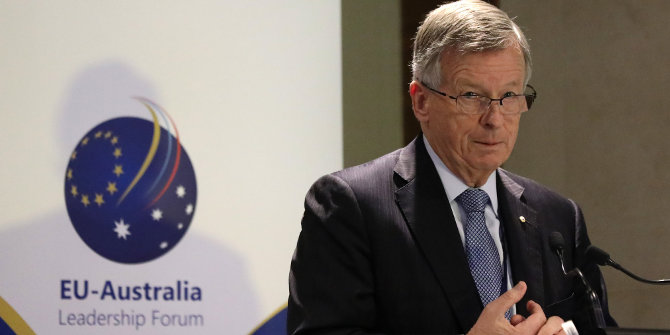

 If the UK is to use Brexit as an opportunity to negotiate new trade agreements with other states outside of Europe, then Australia arguably represents one of the best examples of a future partner. Yet the Brexit referendum also coincided with renewed attempts to develop closer trade relations between the EU and Australia. Laura Allison-Reumann, Margherita Matera and Philomena Murray write that as Australia seeks to establish a new relationship with the UK and the EU following Brexit, the country’s national interests will be best served by adopting a pragmatic rather than nostalgic approach toward future relations.
If the UK is to use Brexit as an opportunity to negotiate new trade agreements with other states outside of Europe, then Australia arguably represents one of the best examples of a future partner. Yet the Brexit referendum also coincided with renewed attempts to develop closer trade relations between the EU and Australia. Laura Allison-Reumann, Margherita Matera and Philomena Murray write that as Australia seeks to establish a new relationship with the UK and the EU following Brexit, the country’s national interests will be best served by adopting a pragmatic rather than nostalgic approach toward future relations.
Since the 2016 British referendum on exiting the EU, Australia has given serious consideration to the implications of this significant event, whilst actively pursuing fruitful trade relations with both the UK and the EU. The UK’s decision to leave the EU is occurring at the same time as EU-Australia trade relations are gaining new momentum. Yet this is coincidental – Australia’s trade and political relations with the EU started to gain new impetus well before the UK’s Brexit decision.
Soon after the referendum, the EU-Australia Framework Agreement was signed in 2017, the EU-Australia Leadership Forum was established in the same year, and EU-Australia free trade agreement negotiations commenced the year after. Although the intersection of Brexit and reinvigorated EU-Australia ties was a chance occurrence, Brexit has implications for future EU-Australia trade relations.

Image from the EU-Australia Leadership Forum held in Sydney in 2017, Credit: Andrew Murray/EU-Australia Leadership Forum (CC BY-NC-SA 2.0)
Australia and the UK have been proactive in seeking closer bilateral engagement following the Brexit referendum and this has involved several initiatives. In 2016, the governments of Australia and the UK agreed to establish a Trade Working Group to prepare for a future trade agreement. In 2018 they launched the Australia-UK Leadership Forum (AUKLF) to strengthen dialogue and cooperation. More recently, they signed a bilateral Wine Agreement and Mutual Recognition Agreement to ensure the continued flow of trade post-Brexit and that arrangements already in place between Australia and the EU for wine and other exports continue to apply to the UK after Brexit.
Yet it has been made clear by Australian leaders that Australia’s trade relations with the EU take precedence over a trade deal with the UK, and Brexit has heightened the need for EU-Australia negotiations to take place and to progress. There is a need to ensure that continued uncertainty regarding Brexit does not hamper the progress of EU-Australia trade negotiations. For Australia’s European trade relations there is concern about the impact of Brexit on the EU trading regime. This is especially the case while much uncertainty remains concerning the final outcome of Brexit negotiations between the EU and the UK. This uncertainty centres on how the termination of the EU’s Common Agricultural Policy will affect UK farmers and the UK’s agriculture industry; and how businesses based in the UK will develop longer term strategies in response to the implementation of an eventual Brexit. Some firms are already moving their offices from London. There remains a lack of clarity as to what Brexit may mean for the UK’s internal politics and economy, as well as, crucially for Australia, its future external relations.
Although the UK is Australia’s largest single European trading partner, it must be borne in mind that approximately two-thirds of Australia’s trade is still with the remaining EU27 (based on 2015 figures). It is also important to take into account Australia’s broader trading context as it pursues trade deals with the EU and the UK. In comparison to Australia’s four leading trade partners (China, Japan, the US, and the Republic of Korea), the UK represents a small overall percentage of Australia’s trade. In the 2016-2017 financial year the UK was Australia’s fifth-largest trading partner in goods and services, yet in the following year it dropped to seventh, being overtaken by India and New Zealand. Thus, whereas Brexit is a consideration within EU free trade agreement negotiations, this will likely be related to specific aspects within the trade deal, such as services, investment and tourism, rather than having the effect of altering the course of EU-Australia trade relations.
Aiding the quest for an EU-Australia free trade agreement and the improvement of trade ties is the EU’s new confidence and assertiveness in pursuing trade deals, something to which Brexit has arguably contributed. Brexit, somewhat ironically, serves as a driver of confidence, with the EU determined to prove that it is a supporter of a liberal trade agenda, and also that it can function effectively on the global stage despite the pressures of Brexit and the eventual departure of the UK.
The resolve of both Australia and the EU to reach a deep free trade agreement deal has been set in the context of global trading tensions and protectionist trends, such as those presented by the US’s current trade priorities and decisions, and the UK’s decision to leave the EU. A shared emphasis on demonstrating how their trade objectives support a rules-based liberal trading order has helped the EU and Australia to focus on common perspectives to maintain a constructive relationship that is comprehensive and includes trade, but also goes well beyond this to cover political and security relations, as indicated in the Framework Agreement.
Brexit has also helped Australia to further distance itself from an outdated, Anglo-centric image of Europe. Although there is a long and rich history between the UK and Australia in terms of culture, language and cooperative agreements, Brexit presents a strong case for Australia to look pragmatically beyond the UK to broader opportunities. The UK’s imperial past, and even Commonwealth ties, do not form the basis of a future partnership with the UK. They are not the strongest argument for cooperation as they barely go beyond historical symbolism, particularly when present-day trade ties in Asia are taken into account.
As a result of Brexit, the UK must develop a new relationship of trust with the EU27, as well as with its other interlocutors, including Australia. In the case of Australia, this new relationship is better situated within present-day strategic and economic imperatives rather than nostalgic musings.
There are indeed implications of Brexit for EU-Australia trade relations, but none of these constitute an overly negative impact on the progress made thus far in the partnership, or on what may be achieved in the future.
Please read our comments policy before commenting.
Note: This article gives the views of the authors, not the position of EUROPP – European Politics and Policy or the London School of Economics.
_________________________________
 Laura Allison-Reumann – Nanyang Technological University
Laura Allison-Reumann – Nanyang Technological University
Laura Allison-Reumann is Research Associate at the Public Policy and Global Affairs Programme, Nanyang Technological University. She is also Associate Fellow of the EU Centre, Singapore. Her research covers regionalism, federalism and EU-ASEAN relations.
 Margherita Matera – University of Melbourne
Margherita Matera – University of Melbourne
Margherita Matera is a Lecturer and Honorary Fellow in the School of Social and Political Sciences at the University of Melbourne. Her research focuses on security and defence cooperation within the European Union (EU), the EU as a foreign policy, security and crisis management actor, NATO and EU-Australia relations.
 Philomena Murray – University of Melbourne
Philomena Murray – University of Melbourne
Philomena Murray is Professor and Jean Monnet Chair ad personam in the School of Social and Political Sciences at the University of Melbourne. She holds honorary positions at Trinity College Dublin; College of Europe, Bruges and United Nations University Centre for Comparative Regional Integration Studies, Bruges. Her research interests include challenges to the EU’s relations with Australia and Asia; comparative regional governance and EU legitimacy.




How can you produce a piece about the relationship between the EU & Australia so enthusiastically & sneer about the UK without talking about the security aspect? Australia relies on shipping lanes & points of access being kept open, what does the EU do to provide security & stability in the South China seas? How often does the EU sent a destroyer through vital shipping lanes in this region as well as the gulf? Simple it relies on those it choses to castigate on forums like this. Australia needs to have it’s security & defense backed up by those willing to do the heavy lifting in far flung places & there isn’t an EU 27 nation that is both “Willing & Able” to do this.
We need the UK so it can keep shipping lanes open in the South China Sea? I think you need to check what century we’re living in mate.
This is a post about trade, not security. If Brexit Britain wants to link the two then that’s up to it, but at this point, FTA/trade deals don’t usually have an explicit security aspect.
It comes down to, once again, that the Brexiters in Britain (and their fellow travellers in Australia – see Downer/Abbott), still fail to understand that Brexit isn’t seen as a benefit or a positive opportunity to deepen relations with Britain. It’s seen as a cost and a risk.
It’s seen that way because it is a cost and a risk. It requires many countries to fundamentally rework how they interact with Britain on a trade or diplomatic basis, purely because Britain made a domestic policy change. This is not a change that the other countries sought or worked towards. So they have to assume the costs of Britain’s decision. The risk is that Britain continues to bumble about and crashes out of the EU without a deal, like the ERG seem to want. Who can trust a country which is led by people willing to destroy 40 years of relations overnight, just to prove a point and then to align closely with Trump, for no obvious financial or political benefit to Britain?
EU-Australia trade deal will take 7 to 10 years , UK-Australia trade deal will take 3 to 7 months
End of BS